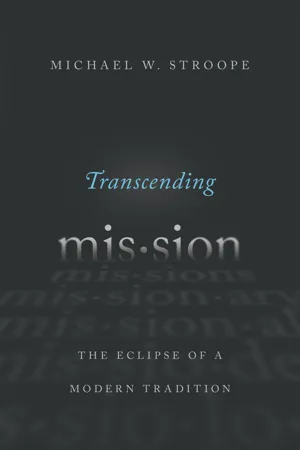
- 477 pages
- English
- ePUB (mobile friendly)
- Available on iOS & Android
About this book
IVP Readers' Choice Award
Mission, missions, missional, and all its linguistic variations are part of the expanding vocabulary and rhetoric of the contemporary Christian missionary enterprise. Its language and assumptions are deeply ingrained in the thought and speech of the church today. Christianity is a missionary religion and faithful churches are mission-minded. What's more, in telling the story of apostles and bishops and monks as missionaries, we think we have grasped the true thread of Christian history.
But what about those odd shapes, those unsettling gaps and creases in the historical record? Is the language of mission so clearly evident across the broad reaches of time? Is the trajectory of mission really so explicit from the early church to the present? Or has the modern missionary enterprise distorted our view of the past?
As with every reigning paradigm, there comes a point when enough questions surface to beg for a close and critical look, even when it may seem transgressive to do so. In this study of the language of mission—its origin, development, and application—Michael Stroope investigates how the modern church has come to understand, speak of, and engage in the global expansion of Christianity. There is both surprise and hope in this tale. And perhaps the beginnings of a new conversation.
Frequently asked questions
- Essential is ideal for learners and professionals who enjoy exploring a wide range of subjects. Access the Essential Library with 800,000+ trusted titles and best-sellers across business, personal growth, and the humanities. Includes unlimited reading time and Standard Read Aloud voice.
- Complete: Perfect for advanced learners and researchers needing full, unrestricted access. Unlock 1.4M+ books across hundreds of subjects, including academic and specialized titles. The Complete Plan also includes advanced features like Premium Read Aloud and Research Assistant.
Please note we cannot support devices running on iOS 13 and Android 7 or earlier. Learn more about using the app.
Information
Notes
Table of contents
- Cover
- Title Page
- Dedication Page
- Contents
- Abbreviations
- Acknowledgments
- Prologue
- Introduction: The Enigma of Mission
- I. Justifying Mission
- II. Innovating Mission
- III. Revising Mission
- Epilogue: Toward Pilgrim Witness
- Works Cited
- Author Index
- Subject Index
- Scripture Index
- Notes
- Praise for Transcending Mission
- About the Author
- More Titles from InterVarsity Press
- Copyright Page